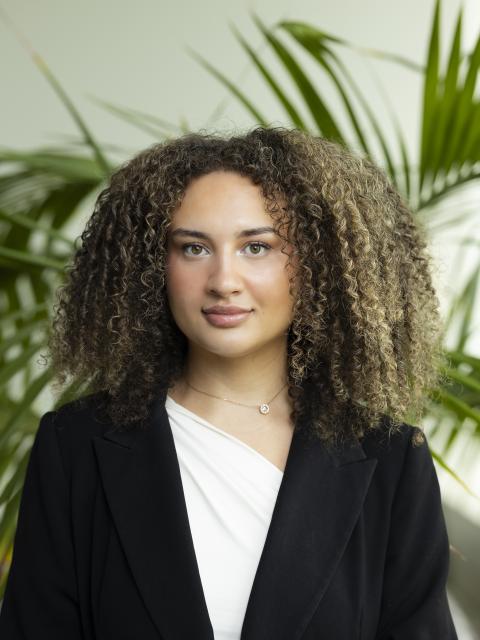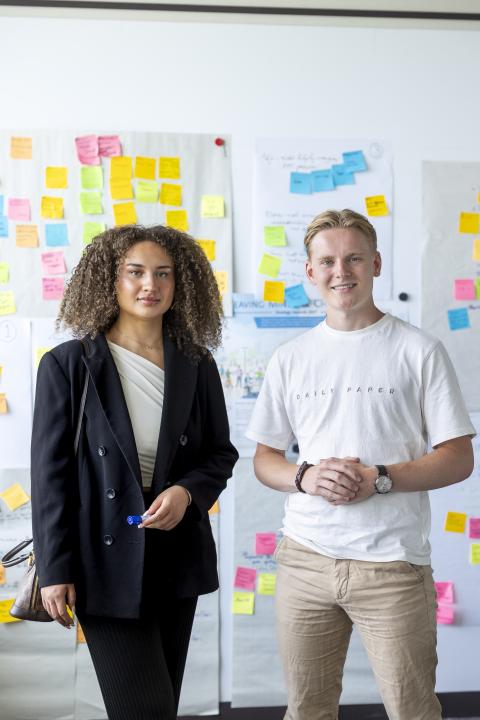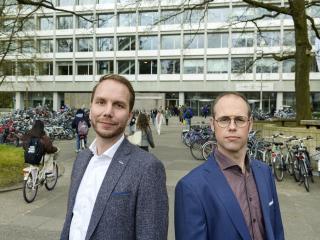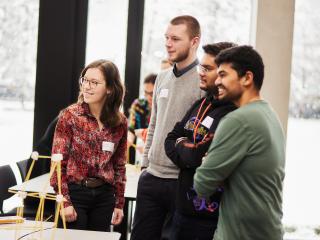A student-assessor knows what is happening among students
A student who sits in on meetings of the Executive Board. That is quite what you may call a 'challenge'. Quite a new role, too. What does this so-called student-assessor do? What is the added value? What things are discussed? How did it all go? Lilly Schurman passed the proverbial baton to Tijs van der Zanden. What are the things that Tijs should take to heart? The outgoing and incoming student-assessors: a double interview.
When Lilly Schurman (24) started as a student-assessor to the Executive Board, she was the first student to fulfil that role. At the end of the summer, her job will be done. Born in Tilburg, with Polish and Jamaican roots, Lilly attended high school at the Odulphus Lyceum and is currently doing two Bachelor’s programs at Tilburg University: Public Administration as well as Law. After the exams, she needs to complete her Public Administration Bachelor’s thesis and she is going to work at a court registry. To be followed by two Master’s programs in Tilburg.
Lilly is an ambitious student with what she calls “great powers of persuasion”. A perfectionist, too. She wants to achieve her full potential. The overly busy schedule says it all. Member of the Advisory Board of Odulphus, working on an election manual for political parties, gave policy advice to the City of Tilburg, supported the board of a political party. On top of all this, she is also taking the Law Top Class, the Honors Program. All these experiences helped her land the job of student-assessor.
Do you have any time left to unwind?
Lilly: "Haha, very little. That is my weakness. I have a broad range of interests and there are many things I enjoy doing."
Don’t get a burn-out ...
Lilly: "That’s what my mom says. But don’t worry, I’m all right. This job will soon be over and then something else will turn up. There is just so much to do."
What do you want to be?
Lilly: "A judge or a lawyer. But politics and policy advice are also very interesting."

This is a fine university but ethnic minorities are underserved
Lilly
Tijs van der Zanden (22) is to succeed Lilly. He is from Oudewater (a city between Woerden and Gouda) and has just completed his Bachelor’s of Business Economics. Probably to be followed by the International Management Master’s in Tilburg. Spent time as an exchange student in Melbourne, Australia. Tijs: "A great country. The mentality there is super-relaxed. A fantastic experience at a university very far away. Your time as a student is a time to develop yourself, not with your nose stuck in a book all the time, but doing fun things besides." He describes himself as an enthusiastic, committed, and curious student. Besides his studies, he is an active member of student association St. Olof and the chair of student party Front in de University Council
Tijs: "That University Council experience was great, being involved in policy decisions and communicating the student perspective to the Executive Board. That is the reason I applied for the job of assessor. Contributing to university policy for another year. Looking forward to it."
You hail from Oudewater. So what brought you to Tilburg?
Tijs: "Everyone at school went to Rotterdam, Amsterdam, or Utrecht. I was attracted to Tilburg because nobody was going there. Besides, my family is from Brabant. After a visit to the university, I was completely sold, especially because of the beautiful green campus. Other places are not so compact. I instantly felt that Brabant hospitality (cliché, I know, haha)!"
Lilly: "For me, Tilburg was a practical choice. Plus, Tilburg Law School is number 1 in the Netherlands. No, not Leiden!"
Is there a difference in attitude between Randstad and Brabant?
Tijs: "I should say so, yes. People here are more open, more down to earth, more informal. 'Why the hell are you going to Tilburg?’ they said. Man, they have never been to Tilburg. I feel right at home here."
Any ambitions?
Tijs: "Learning more and developing further. Later maybe a management position in an international company that has a positive impact on the world. Australia would be nice. But ultimately I will want to come back to the Netherlands."
I want my voice to be heard
Lilly
Why did you want to become student-assessor?
Lilly: "I want my voice to be heard. And do something that is a good fit with my studies. I had just finished a project at the City of Tilburg and gained some experience in giving advice."
How did you like being a student-assessor?
Lilly: "Extremely well. Learned a lot. It took me some time to find my way. You are invited for all sorts of things; it was hard to find out what bodies and subjects are really important. I did join a few committees but not everything is of interest to students, and it’s them I represent after all. You need to choose because you won’t be able to fit it all into those 0.3 FTE. I did find my bearings after a while."
What have you achieved?
Lilly: "As regards policy issues, I promoted the cases of minorities, women, internationals, and students with a low socio-economic position, in order to make the university more attractive to these people. This is a fine university but ethnic minorities and Dutch students with a migration background are underserved. Inclusion also applies to me. That is a daily reality for me, so it affects me. Everyone should be treated equally, but sadly that is not the case. I am very glad that the Executive Board takes me seriously."
What can be improved in this context?
Lilly: "Student associations are given money to stimulate inclusiveness, fine, but broader action needs to be taken. Organize inclusive events that are fun for everyone, for instance, a campus cinema. And we need to organize something to celebrate Keti Koti. TOP Week, carnival, and similar festive events do not have so much appeal for minorities. That is how I feel, too."

For this position, it is important to adopt a broad perspective and represent all students
Tijs
Tijs: "That is not my experience. This is new to me. What advice can you give me to get access to this perspective? Who do you talk to? Where can I find these people?"
Lilly: "Talk to people with a different frame of reference. I am in the Library every day, and talk to students. There are more students with a different ethnic background there. What do they think of certain issues? What do they miss? It can be little things. Whether or not food is allowed in the Library. Do they feel part of the community? You can pick up some really interesting points of view."
Tijs: "I’ll bear that in mind. For this position, it is important to adopt a broad perspective and represent all students. With Front, we have discussed how we could organize inclusive events. That’s not as easy as it sounds. Night University is one event that attracts many internationals."
Lilly: "It already starts with TOP Week. The beer cantus, lots of alcohol. The music. I don’t really care for it and neither do many fellow students around me."
Tijs: "That beer cantus is typically Tilburg, with Dutch songs to sing along, that is pretty good fun, isn’t it?"
I prefer to ask the opinion of students who are under the radar
Lilly
Lilly: "There is no need to discontinue the cantus, but you need to organize alternative inclusive events. After all, this is the period in students’ lives in which they make deep and lasting friendships. It is a pity if TOP Week gets off on the wrong foot for minorities."
Tijs: "For internationals and Master’s students, there is a separate introduction in winter, because they start their studies in the second semester. It is a good start for them, I think. But it’s true that TOP Week is not top fun for everyone."
Lilly: "There is also a big gap between international and Dutch students."
Tijs: "I can relate to that. We can do better with integration there. In Amsterdam this is not such an issue; in Australia neither, as I know from experience."
Lilly: "It is important that Dutch ethnic minorities are stimulated to participate in the international classroom. That will also promote diversity. It is really important that students learn to interact with people from other cultures, that you behave to others in an appropriate way, now and later in your working life. The Executive Board shares my views; I really appreciate that. There is more attention for inclusiveness now. But we are not there yet by any means."
Besides inclusiveness, diversity, and non-discrimination, Lilly has also argued in favor of a collection point for plastic bottles and of replacing the student card by an environmentally friendly QR code. The assessor is involved in policy documents on a detailed level and asks critical questions. For instance, Lilly called for attention to digital education, the international classroom, the accessibility of the university, community building, and involving students in research.
Lilly: "At other universities, students receive e-mails, asking them to participate in a study. I have never received such an invitation. Students can learn from researchers, and researchers can learn from the new perspectives from the student angle."
My focus will be on digitalization and student wellbeing
Tijs
Can you speak freely?
Lilly: "Certainly. Some documents are confidential. Everyone speaks openly and freely in my presence. Of course there are differences of opinion, different perspectives, that is only natural. I have not experienced any confrontations. Everyone treats others with respect."
The assessor needs to adopt an active attitude. In the beginning, Lilly was more in touch with the student parties SAM and Front. The assessor participates in an advisory capacity and has no representative position. In that role, she asks the opinions of students who are under the radar, who are not so active. Besides the University Council, student groups, and committees, she liaises with organizational units like Human Resources, Facility Services, and Academic Services.
Lilly: "Tijs already has that experience. That’s a bonus."
Tijs: “Yes, in that respect I know the ropes, what issues are important and who to approach. I am familiar with the Finance committee and the University Council. I know the members of the Executive Board."
Lilly: "All members of the Executive Board were part of my recruitment procedure. Three intensive interviews. With many people on the other side of the table. Fortunately, I am not at a loss for words. A useful quality in this position. At one point, I thought: if they don’t select me now …! Haha."

What are your policy priorities?
Tijs: "My focus will be on digitalization and student wellbeing. During the Covid crisis, a sudden shift was made to online education. It was a steep learning curve. The university should continue to modernize with innovations that have added value for students. Blended learning is fine. We have the cameras, all the technical facilities; it would be a waste not to use them. But in-person classes must stay. You get to know your fellow students better and the campus is a great place to get together. I am going for a sticky campus, where students stick around so they become more connected with the university."
Lilly: "I agree. Online lectures truly support in-person classes. The instructors do not need to be afraid that students don’t turn up, even though at the Law School, for instance, almost all lectures are available online. I like that. Sometimes you have trouble concentrating, you fail to understand something, or you are ill. At home, you can watch the whole thing again and prepare even better for your exams."
Make some room for courses on wellbeing and Psychology
Tijs
You also mentioned student wellbeing ...
Tijs: "Yes, student wellbeing is a topic that has received much attention recently. When you hear how many students are struggling with mental problems, burn-outs, that scares me. This is the time to discover who you are. Many people do not realize how important wellbeing is. We learn a lot about our chosen programs, but we are not taught how to self-regulate our thoughts."
Have you noticed this in your immediate environment?
Tijs: "Certainly. I see it everywhere and I know students who have experienced this. The university can respond to this. Feeling confident and relaxed will help you a lot later on. A few simple tricks have made the difference for many. Basic things, like meditation, talking, more options in their programs. Most Bachelor’s programs are rather inflexible, so make some room for courses on wellbeing and Psychology, on data, sustainability, and interdisciplinary education. The university prepares you for the job market and if you are mentally strong, that will stand you in good stead, during your studies but also afterwards, on both personal and professional levels."
Lilly: "I have also argued in favor of more courses on cultural differences and discrimination. These are life themes. How do you interact with colleagues, or with students if you are an instructor? How do you talk to clients? I also looked closely at outgoing texts and where necessary suggested a more empathetic or understanding message."
And: "I used to have the feeling that I was not always taken seriously. The Executive Board has never given me that feeling, though. They appreciate my points of view and intelligence. I feel heard and valued, very much so. It should be like that everywhere, but unfortunately that is not the case. Before I took on this position, I was not very involved in the university, but now I think of Tilburg University as my university. I look at things differently now."
Finally Tijs: "It is quite unique that we at our age are given the opportunity to sit in on the board meetings of a large organization like the university. Normally, you need to have worked at a company for many years before such a position comes within reach. We are very lucky to have experienced this."
What does the Executive Board’s student-assessor do?
The student member of the Executive Board provides input for university policy, with an emphasis on education- and student-related issues and, in decision-making, brings the student perspective to the board table. The assessor participates in the weekly Executive Board meetings in an advisory position and sits in on the University Council meetings (eight times a year) and other relevant consultations. The assessor maintains a good relationship with students, the student-assessors at the Schools, and student organizations and with student representatives in participative decision-making forums. The assessor is aware of what is happening among the student community. All documents are in English, meetings are in Dutch.
Inclusiveness
Inclusiveness is creating an environment in which all individuals, irrespective of background, culture, gender identity, sexual orientation, religion, or physical or mental health, feel welcome and valued and enjoy equal opportunities. This means that people feel accepted and can participate fully in the day-to-day life of the organization or community, without having to adapt to a dominant culture or group.



